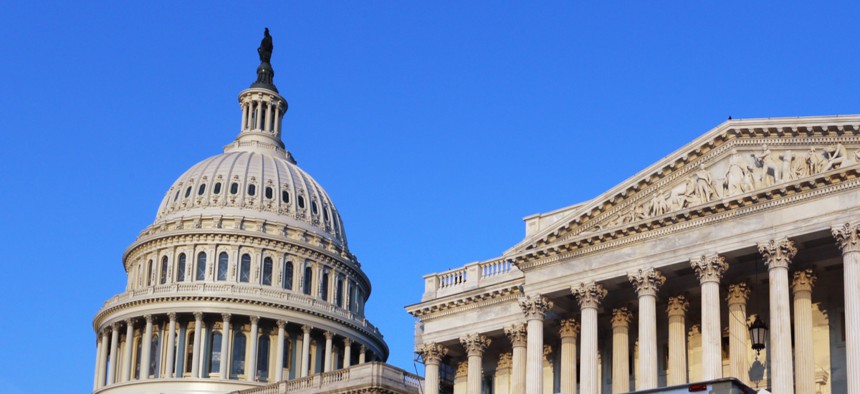U.S. Senate Bill That Would Block CDBG Funds for ‘Sanctuary’ Cities Irks Mayors

The U.S. Capitol in Washington, D.C. Shutterstock

Connecting state and local government leaders
The GOP-backed measure comes as sparring between the U.S. Department of Justice and local governments continues over immigration-related issues.
WASHINGTON — A group that represents U.S. mayors is blasting a Republican-backed Senate border security bill, which would withhold federal funds for community and economic development from places that do not meet certain immigration enforcement requirements.
The U.S. Conference of Mayors issued a statement over the weekend calling parts of the Building America’s Trust Act “mean-spirited” and “likely unconstitutional.” At issue is language in the legislation that would block places with so-called “sanctuary” policies from receiving Community Development Block Grants and Economic Development Administration grant funding.
Withholding these grants would go beyond previous U.S. Department of Justice efforts under President Trump to restrict law enforcement grants from going to “sanctuary” jurisdictions—a reference to places that limit their cooperation with federal immigration authorities.
“We will oppose any bill that contains a provision that seeks to punish cities for such local policies by withholding federal funds,” Tom Cochran, CEO and executive director of the Conference of Mayors, said in a statement. “These provisions jeopardize public safety, preempt local authority, and expose local governments to litigation and potential findings of damages.”
U.S. Sen. John Cornyn, a Texas Republican, is the lead sponsor of the legislation, which was introduced on last Thursday.
Asked Monday about the Conference of Mayors’ criticism of the bill, Cornyn’s office responded by highlighting a letter sent last week to the senator from the National Association of Police Organizations, a coalition of police unions and associations across the U.S.
“NAPO has long supported efforts to clamp down on sanctuary policies in cities, which make it difficult for law enforcement to effectively protect communities,” the letter said.
It added: “The Building America’s Trust Act takes crucial steps to eliminating sanctuary jurisdictions, which pose real threats to the American people.”
Cornyn said last week that he believed the grant-withholding provisions targeting sanctuary jurisdictions would give the legislation “some real teeth.”
Six GOP co-sponsors signed onto the bill: U.S. Sens. John Barrasso of Wyoming, Ron Johnson of Wisconsin, Thom Tillis of North Carolina, Dean Heller of Nevada, Tim Scott of South Carolina and James Inhofe of Oklahoma.
The portions of the bill affecting EDA grants and Community Development Block Grants, which the U.S. Department of Housing and Urban Development administers, are included in a section of the legislation called the “Stop Dangerous Sanctuary Cities Act.”
This section, according to an aide in Cornyn’s office, mirrors a bill by the same name that U.S. Sen. Pat Toomey, a Pennsylvania Republican, introduced last year. Toomey’s measure was mostly Republican-backed. But the aide noted that it also drew support from two Democrats—U.S. Sens. Joe Donnelly of Indiana and Joe Manchin of West Virginia.
A definition for the term “sanctuary jurisdiction” is included in the bill introduced last week. The definition hinges on factors that have been central to the ongoing debate about sanctuary policies.
One is whether a state or locality prohibits or restricts information about a person’s immigration or citizenship status from being shared between government agencies.
The definition also takes into account whether jurisdictions comply with federal requests known as "detainers."
Detainers are when U.S. Immigration and Customs Enforcement asks state or local law enforcement to keep a person suspected of being in the country illegally in custody for up to 48 hours longer than they otherwise would, or to provide notice before the person is released. The idea is to give ICE a chance to take the person into custody.
The Senate legislation includes language meant to shield states and localities from lawsuits they might face for holding a person in custody in response to a federal detainer request.
Sparring over immigration policy between cities and the U.S. Department of Justice—which has gone on since early in Trump’s term—has continued in recent days.
The city of Chicago filed a lawsuit Monday against U.S. Attorney General Jeff Sessions, challenging conditions tied to immigration enforcement that the Justice Department is seeking to impose for local governments applying for assistance through the Edward Byrne Memorial Justice Assistance Grant program.
And, last week, the Justice Department demanded information about immigration-related policies and practices from four cities that had expressed interest in accessing federal aid through a Byrne JAG initiative designed to help places with high levels of violent crime.
The four cities included Albuquerque, New Mexico; Baltimore, Maryland; and San Bernardino and Stockton in California.
Officials in Albuquerque and Baltimore raised questions about why the Justice Department was pressing them for some of the information, when the detention facilities the DOJ inquiry focused on were operated by county and state government.
Bill Lucia is a Senior Reporter for Government Executive’s Route Fifty and is based in Washington, D.C.

NEXT STORY: Nashville Mayor Opens Up About the Tragedy of Losing Her Son





